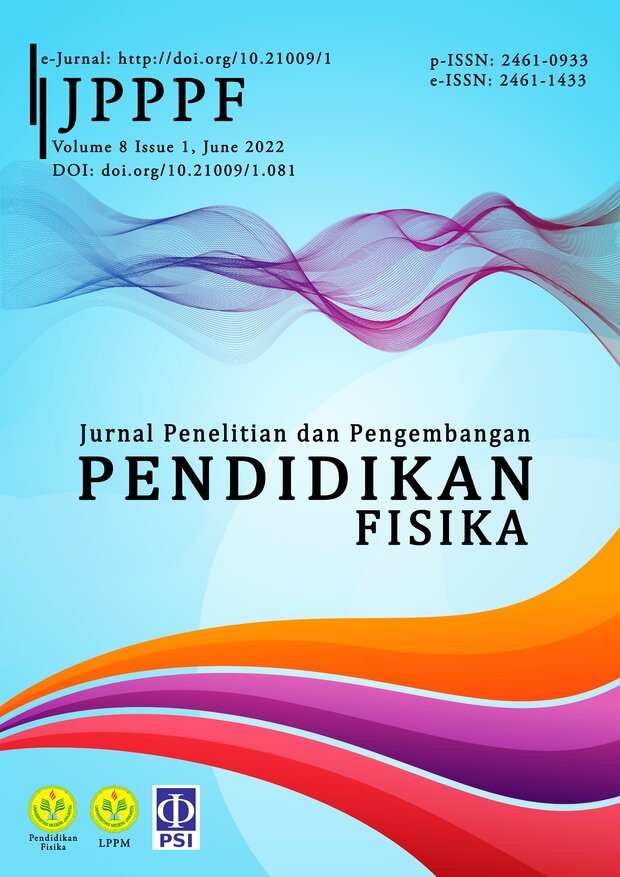Validity and Reliability of Critical Thinking Instruments to Measure the Effectiveness of Context-Based Physics E-Module on Wave Materials
DOI:
https://doi.org/10.21009/1.08106Keywords:
validity, reliability, critical thinking instrument, context-based e-module, waveAbstract
Critical thinking skills can be improved through learning physics. Independent teaching materials such as e-modules are needed. Instruments are needed to measure the success of e-module use. This study aims to develop critical thinking skills instrument on physics learning using e- module-based on the context of the material of mechanical waves and stationary waves. The instrument criteria are valid and reliable. The form of the instrument is an essay test that includes five aspects: Interpretation, Analysis, Evaluation, Explanation, and inference. The instrument consists of 18 items. The development model used is ADDIE, with the stages of Analysis, Design, Development, Implementation, and evaluation. The expert validation for each aspect is content 0.84, construct 0.88, and language 0.83 with valid categories. While the results of the empirical validation for five aspects of critical thinking skills are: interpretation three items, analysis three items, evaluation four items, explanation four items, and inference two items are valid. Four items are invalid. These items were discarded. Reliability for critical thinking instrument obtained 0.78 with good category. Referring to the research finding, it can be concluded that the instrument was feasible to use. The impact of this research is the production of a valid and reliable critical thinking instrument, which is used to measure students’ critical thinking skills.
References
Anggeni, YD, Festiyed, F, Asrizal, A 2019, ‘Meta-Analisis Pengaruh Model Pembelajaran Project Based Learning Terhadap Kemampuan Berpikir Kritis Peserta Didik SMA’, Pillar of Physics Education, vol. 12, no. 4, pp. 881-888.
Arends, RI 2012, ‘Learning to Teach: 9th Edition’, New York: McGraw-Hill.
Arifin, Z 2017, ‘Kriteria Instrumen dalam Suatu Penelitian’, Jurnal THEOREMS , vol. 2, no.1, pp. 28-36.
Asrizal, A, Amran, A, Ananda, A, Festiyed, F 2018, ‘Development of Adaptive Contextual Teaching Model of Integrated Science to Improve Digital age Literacy on Grade VIII Students’, International Conference on Science and Technology, vol. 1116, pp. 1-9.
Asrizal, A, Hufri, H, Festiyed, F 2015, ‘Development of Authentic Assesment for Supporting the Inquiry Learning Model in Basic Electronics 1 Course’, ICOMSET.
Azwar, S 2015, ‘Reliabilitas dan Validitas’, Yogyakarta: Pustaka Belajar
Ennis, RH 1985, ‘A Logical Basic for measuring critical thingking skills’, Association for Supervision and Curriculum Development.
Facione, PA 2015, ‘Critical Thinking: What is it and Why it Counts’, Insight Assesment, no. 1, pp. 1-23.
Hassoubah, ZI 2014, ‘Developing Creative & Critical Thinking Skills’, Bandung:Yayasan Nuansa Cendikia.
Herliandry, LD, Ahmad, H & Jannatin, A 2019, ‘Kemampuan Berpikir Kritis Fisika Peserta Didik Kelas X dengan Model Brain Based Learning’, Jurnal Penelitian Pendidikan IPA (JPPIPA), vol. 5, no. 1, pp. 39-47.
Husnah, M 2017, ‘Hubungan Tingkat Berpikir Kritis Terhadap Hasil Belajar Fisika Siswa dengan Menerapkan Model Pembelajaran Problem Based Learning’, Journal of Physics and Science Learning (PASCAL), vol. 1, no. 2, pp. 10-17.
Jamaluddin, A, Jufri, W, Muhlis, M & Bahtiar, I 2020, ‘Pengembangan Instrumen Keterampilan Berpikir Kritis pada Pembelajaran IPA’, J Pilar MIPA, vol. 15, no. 1, pp. 13-19.
Kusuma, W, Basirudin, B & Soraya, S 2021, ‘Peningkatan Kreativitaas Mahasiswa Melalui Penyusunan Instrumen Penelitian’, Jurnal pengabdian Pada Masyarakat, vol. 1, no. 2, pp. 143-148.
Latifa, BRA, Verawati, NNSP & Harjono, A 2017, ‘Pengaruh Model Learning Cycle 5e (Engage, Explore,Explain, Elaboration, & Evaluate) Terhadap Kemampuan Berpikir Kritis Peserta Didik Kelas X MAN 1 Mataram’, Jurnal Pendidikan Fisika dan Teknologi, vol. 3, no. 1, pp. 61-67.
Mappalessye, N, Sari, SS & Arafah, K 2021, ‘Pengembangan Instrumen Tes Kemampuan Berpikir Kritis dalam Pembelajaran Fisika’, Jurnal Sains dan Pendidikan Fisika, vol. 17. no. 1, pp. 69-82.
Matsun & Saputri, DF 2020, ‘Pengembangan E-Modul Fisika Berbantuan Whatsapp Sebagai Alternatif Pemebalajaran Di Masa Pandemi Covid 19’, Jurnal Hasil Kajian, Inovasi, dan Aplikasi Pendidikan Fisika, vol. 6, no. 2.
Nosics, GM 2012, ‘Learning to Think Things Through’, Boston: Pearson Education.
Pradana, SDS, Parno & Handayanto, SK 2017,’ Pengembangan Tes Kemampuan Berpikir Kritis Pada Materi Optik Geometri untuk Mahasiswa Fisika’, Jurnal Penelitian dan Evaluasi Pendidikan vol. 21, no. 1, pp. 51-64
Purwanto, N 2010, ‘Prinsip-Prinsip dan Teknik Evaluasi Pengajaran’, Bandung: Remaja Rosdakarya
Rahmi, A & Suparman, S 2019, ‘Analisis KebutuhanModul Dengan Pendekatan CTL untuk Meningkatkan Motivasi Belajar dan Keterampilan 4 C pada Peserta Didik’, Prosiding Sendika, vol. 5, no. 1, pp. 121-126.
Rangkuti, MA & Ridwan, AS 2018, ‘Analisis Kemampuan Berfikir Kritis Menyelesaikan Masalah Fisika Pada Pembelajaran dengan Model Pembelajaran Inkuiri’, Jurnal Inovasi Pembelajaran Fisika (INPAFI), vol. 6, no. 3, pp. 10-18.
Rochmad, R 2011, ‘Model Pengembangan Perangkat Pembelajaran Matematika’, Jurusan Pendidikan Matematika Fakultas FMIP
Sadhu, S & Laksono, EW 2018, ‘Development and Validation of an Integrated Assessment for Measuring Critical Tinkhing and Chemical Literacy in Cemical Equillibrium’, International Journal of Instruction, vol. 11, no. 3, pp. 557-572.
Sugiyanti, L, Arif, A & Mursalin, M 2018, ‘Pembelajaran Abad ke 21 di SD’, Prosiding Seminar dan Diskusi Nasional Pendidikan Dasar, pp. 439-444
Tiruneh, DT, Verburgh, A & Elen, J 2014, ‘Effectiveness of Critical Thinking Instruction in Higher Education: A Systematic Review of Intervention Studies’, Higher Education Studies, vol. 4, no. 1.
Utami, SN, Siahaan, P & Setiawan, A 2018, ‘Development of Critical Thinking and Creativite Thinking skills on Fluids Motion’, International Conference on Mathematics and Science Education, vol. 3. pp. 209-211
Wulandari, BC, Rusilowati, A & Saptono, S 2021, ‘The Development of Performance Assessment Instrument Integrated 4C for Measuring Science Process Skills in the Science Experiments of Elementary School Students’, Journal of Primary Education, vol. 10, no. 2, Pp. 233 - 241.











